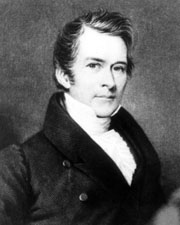John Macpherson Berrien
| John Macpherson Berrien | |
|---|---|
 |
|
|
United States Senator from Georgia |
|
|
In office March 4, 1841 – May 28, 1852 (temporarily resigned his seat from May 1845 to November 1845) |
|
| Preceded by | Wilson Lumpkin |
| Succeeded by | Robert M. Charlton |
| 10th United States Attorney General | |
|
In office March 9, 1829 – June 22, 1831 |
|
| President | Andrew Jackson |
| Preceded by | William Wirt |
| Succeeded by | Roger B. Taney |
|
United States Senator from Georgia |
|
|
In office March 4, 1825 – March 9, 1829 |
|
| Preceded by | John Elliott |
| Succeeded by | John Forsyth |
| Member of the Georgia Senate | |
|
In office 1822-1823 |
|
| Personal details | |
| Born |
August 23, 1781 Rocky Hill, New Jersey |
| Died | January 1, 1856 (aged 74) Savannah, Georgia |
| Political party | Whig |
| Spouse(s) | Eliza Richardson Anciaux (b. September 19, 1783 at Newport, RI; d. August 27, 1828) Eliza Cecil Hunter |
John Macpherson Berrien (August 23, 1781 – January 1, 1856) of Georgia was a United States senator and Andrew Jackson's Attorney General.
Born at Rocky Hill, New Jersey, to a family of Huguenot ancestry, Berrien moved with his parents to Savannah, Georgia, in 1782; was graduated from Princeton College in 1796; studied law in Savannah; was admitted to the bar at the age of 18, and began practice in Louisville, Georgia, in 1799. After he returned to Savannah he was elected solicitor of the eastern judicial circuit of Georgia in 1809; judge of the same circuit from 1810 until January 30, 1821, when he resigned. He served as captain of the Georgia Hussars, a Savannah volunteer company, in the War of 1812.
Berrien was a member of the Georgia Senate from 1822 to 1823. He was elected as a Jacksonian Democrat to the United States Senate and served from March 4, 1825. In The Antelope case of 1824, he argued against the freedom of slaves captured at sea noting slavery "lay at the foundation of the Constitution" and that slaves "constitute the very foundation of your union". On March 9, 1829, he resigned from the Senate to accept the position of Attorney General in the Cabinet of President Andrew Jackson. He held that post from March 9, 1829, until June 22, 1831, when he resigned. During his tenure as Attorney General, Berrien supported states' rights in the Nullification Crisis. In the case of the Negro Seamen Acts, he considered the acts to be appropriate exercises of the states' police powers, and beyond the reach of the federal government. After leaving the Cabinet he resumed the practice of law until he was again elected, as a Whig, to the U.S. Senate and served from March 4, 1841, until May 1845, when he again resigned to accept an appointment to the supreme court of Georgia; again elected in 1845 to the United States Senate to fill the vacancy caused by his second resignation; reelected in 1846 and served from November 13, 1845, until May 28, 1852, when he resigned for the third time.
...
Wikipedia
